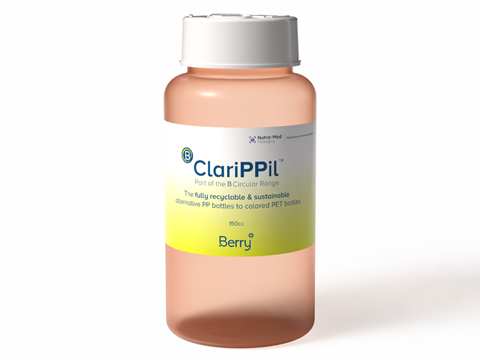
Berry Global has launched a range of clarified polypropylene (PP) bottles for healthcare applications, said to have a reduction of approximately 71% in CO2 emissions and improved recyclability compared to traditional coloured PET pill bottles.
The company states the ClariPPil bottles have ‘excellent functionality, product protection, and aesthetics’ and can be used for a variety of products including vitamins, nutraceuticals, dietary supplements, beauty supplements and OTC treatments. The new bottle has reportedly achieved a RecyClass A certification for its recyclability in countries with the appropriate recycling infrastructure in place, when combined with Berry’s PP closures.
ClariPPil bottles are available in green and light and dark amber, with custom colours available to be produced on demand. Berry says that whereas similar packs in coloured PET can pose a challenge to the recycling stream, the coloured ClariPPil bottles are all widely recyclable in countries with the appropriate recycling infrastructure in place.
According to an internal Life Cycle Assessment (LCA) calculation, the bottle’s new manufacturing technology delivers a reduction of approximately 71% in CO2 emissions, compared to the traditional injection stretch blow moulding process for PET bottles. Apparently, ClariPPil bottles also deliver up to 84% improved moisture ingress protection compared to PET, aiming to ensure extended product integrity and effectiveness.
The bottle is available in 100, 120 and 150cc sizes and has a universal 38mm neck for compatibility with a range of standard closures, including child-resistant options. The design also includes a wide decoration area for individualized branding.
In September, Berry announced a new standard bottle seeking to unlock quick, low-cost customization at low minimum order quantities (MOQs) for personal care, home care, and healthcare products. Available in up to 100% post-consumer recycled plastic, customers can choose from ten standard versions, or work with Berry’s designers to produce bespoke finishes via a quick-change tooling creation process.
Earlier this month, the company’s UK recycling business revealed it had invested in upgrading its plastic packaging recycling complex in Derbyshire, which recycles flexible plastic waste including retail packaging such as carrier bags, bread bags, film wrapping, and plastic pouches. The facility has also been designed to reduce overall water consumption, as the water used during the recycling process is recirculated and reused.
If you liked this story, you might also enjoy:
The ultimate guide to the Packaging and Packaging Waste Regulation in 2024
How are the top brands progressing on packaging sustainability?
Sustainable Innovation Report 2024: Current trends and future priorities
Everything you need to know about global plastic sustainability regulation















No comments yet